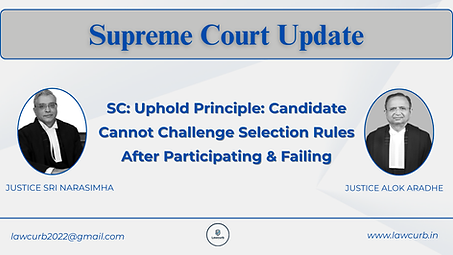top of page

Latest Blog Posts
Daily Legal Updates

The Supreme Court ruled two key points: first, a candidate cannot challenge selection rules after participating without protest and failing. Second, AICTE Regulations for career advancement cannot apply to direct state-level recruitment of Professors, as state commissions are autonomous under their own State Rules for initial appointments.

The Supreme Court has held that a candidate who participates without protest in a selection and fails is estopped from challenging its rules later. It also ruled that AICTE Regulations for career advancement cannot override State Rules or apply to the direct recruitment of Professors by autonomous state commissions.
Orders
YouTube Latest Videos
MEANING OF LAW EXPLAINED
QUICK GUIDE FOR LEGAL NOTICE!
bottom of page






